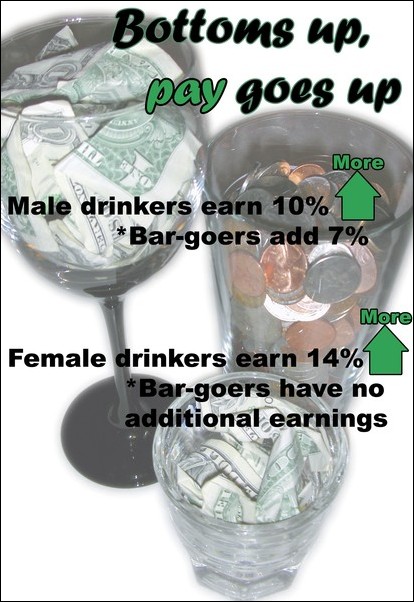Bottoms up, pay goes up
Image: Bottoms up, pay goes up:Click to enlarge. Graphic illustration by Jocelyn McGregor/The State Hornet:
November 15, 2006
Cheers! Here’s to better pay. People who drink alcohol earn 10 to 14 percent more than people who don’t, according to a recent study done by economist Bethany Peters and San Jose State economics professor Edward Stringham.
“At first I pretty much assumed that conventional wisdom is correct,” Stringham said. “I thought (drinking alcohol) was something people would do for fun but not good for their earnings, but my co-author and I found a positive correlation associated with higher earning.”
The study used a national data set that included nearly 8,000 people and contained the employment status, salary and drinking patterns of each. It found that men who drink earn 10 percent more and women who drink earn 14 percent more than those who don’t.
The data set lumped moderate drinkers with heavy drinkers together, not differentiating how many drinks they have when they go out.
“If you go out socially to drink, you’re increasing network, meeting potential employers, customers and building relationships with coworkers,” Stringham said. “When you know more people, your social capital goes up.”
Yasmine Bikul, a Sacramento State senior who worked as a cocktail waitress at a popular downtown bar, said she often served people who were looking to relax after a long day’s work.
Bikul said after a few drinks, people usually loosen up and are able to talk openly in a casual setting.
“I’ve actually seen lawyers and government businessmen sign contracts and strike verbal deals at the bar,” Bikul said.
While on most occasions they drink moderately to remain presentable and coherent, when there’s a big summit or government meeting, they come in and stumble out, Bikul said.
Senior Akela Douglass, who bartends at the downtown Sheraton Hotel, said she often serves out-of-towners who come for conferences and end up in the bar.
“People who travel alone will go to the bar and trade business cards,” Douglass said.
However, the pay perks are not equal for all.
The study found that men who frequently go to bars ?” at least once a month ?” earn an additional 7 percent in their income, while women don’t see any extra boost.
Stringham said the study indicates that social drinking enables social networks, which results in bigger paychecks.
Stringham couldn’t explain why women who go to bars don’t receive the same added bonus as the men, but he said he guesses that women are doing their socializing elsewhere, such as at homes or parties.
Jacqueline Carrigan, Sac State associate professor of sociology, said she speculates that the difference in additional pay is due to the old social double standard.
“Traditionally, women who go to bars are seen as sexually promiscuous perhaps and a little looser in their morality,” Carrigan said. “That’s not going to help her get ahead.”
It wouldn’t be anything out of the ordinary for men to go out with their co-workers or even by themselves after work to hang out at a bar, she said.
However, male or female, double standard or not, drinkers still earn more than teetotalers.
“Many colleges over the last few years are cracking down on college drinking in the name of helping the students,” Stringham said.
“I think these policies are going to have unintended consequences,” he said. “By preventing students from social drinking, they’re preventing them from developing social networking skills and building networks in college.”
Chad Altringer, a senior and a shift manager at the campus Round Table Pizza, said that students rarely come in to network even though it’s the one of two places that serves alcohol.
“I think there’s a lot of opportunity to network (at Round Table Pizza) between faculty and students,” Altringer said. “But not a lot of that happens.”
Altringer said he guesses that students mostly drink off campus in bars or parties.
Heather Dunn Carlton, coordinator of the university’s Alcohol Education Program, said it’s important to stress that there definitely is a correlation between social drinking and higher pay but it’s not a cause-and-effect deal.
It’s not the alcohol that causes people to get pay increases; it’s what people are doing socially that matters, Dunn Carlton said.
A lot of students go to parties and hold a non-alcoholic beverage, so they can network under the same environments, Dunn Carlton said.
“Just because you don’t drink doesn’t mean you can’t enjoy the social setting,” she said.
On a diverse campus where there are so many concerts, lectures and art shows going on all the time, students should take advantage and get involved, Dunn Carlton said.
At Sac State, where 75 percent of the students reportedly have zero to three drinks per week and 79 percent drink once a week or less, Dunn Carlton said students are socializing and drinking but being responsible at the same time.
If students choose to drink, Dunn Carlton said she recommends eating a meal high in fat and protein beforehand, finding a designated driver, limiting alcoholic drinks to one per hour and matching each alcoholic drink with one nonalcoholic drink.
Stringham said he thinks people should make their own decisions with what they want to do and that if they want to engage in responsible social drinking, they should be allowed to and reap the benefits.
“We’re quick to ban beer at sports stadiums and festivals. The legal blood alcohol level is dropping everywhere, and we’re barraged with over-hyped warnings about binge and underage drinking,” Stringham said. “Instead of fear mongering, we should step back and acknowledge the proven health and economic benefits that come with the responsible use of alcohol.”
Mary Chou can be reached at [email protected]







































































































































